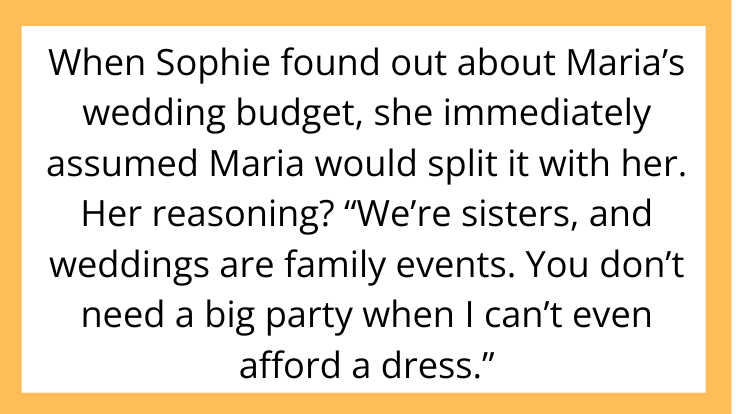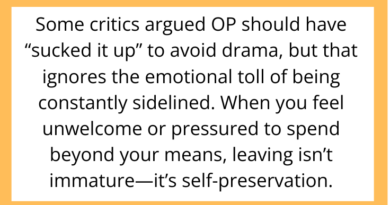AITAH for Telling My Sister She’s Not Entitled to My Wedding Budget?
Weddings are supposed to be joyful celebrations of love, but sometimes they become the perfect storm for family drama. In today’s AITAH scenario, we dive into a story where boundaries, entitlement, and sibling rivalry collide. Let’s unpack the situation and see who, if anyone, is really the villain here.
The Story: When Generosity Becomes Expectation

A 28-year-old woman—let’s call her Maria—shared her story on the r/AITAH subreddit. Maria got engaged last year and began planning her dream wedding. She and her fiancé had saved diligently and put aside about $20,000 for the celebration.
Maria’s younger sister, Sophie, 25, has always struggled financially. Sophie never finished college, moved in and out of jobs, and has depended on their parents for support well into her twenties. Recently, Sophie also got engaged. But unlike Maria, she didn’t have any savings.
When Sophie found out about Maria’s wedding budget, she immediately assumed Maria would split it with her. Her reasoning? “We’re sisters, and weddings are family events. You don’t need a big party when I can’t even afford a dress.”
Maria was stunned. She explained that she and her fiancé worked hard for this money. They wanted to use it for their own day, not fund someone else’s. But Sophie wouldn’t let it go. She involved their parents, who pressured Maria to “do the right thing.”
Frustrated, Maria told Sophie she wasn’t entitled to any of the budget, and she needed to plan her own wedding within her means. Sophie burst into tears and called her selfish. Now Maria wonders: AITAH for telling my sister no?
Why This Strikes a Nerve: Family, Money, and Guilt

The Emotional Undercurrents
Money has a way of complicating even the healthiest of family relationships. In this scenario, guilt and entitlement are tangled together:
-
Maria feels guilty because she loves her sister.
-
Sophie feels entitled because she believes family should share resources.
But just because you love someone doesn’t mean you owe them everything you’ve worked for.
Maria’s Perspective: Hard Work and Fair Boundaries

From Maria’s point of view, the money was saved for a specific purpose: a once-in-a-lifetime celebration. She and her fiancé sacrificed vacations, nights out, and luxuries to build that fund.
It wasn’t a gift. It wasn’t extra cash lying around. It was their wedding budget.
When her sister demanded a share, Maria felt it was crossing a boundary—transforming her careful planning into an obligation. And while it’s natural to want to help family, it doesn’t mean you have to give up your own dreams.
Sophie’s Perspective: Feeling Left Behind

Sophie’s frustration is also understandable. She’s watched her sister’s life fall into place while she struggles to find stability. Seeing Maria with the means to have a beautiful wedding might have stirred up feelings of inadequacy and jealousy.
But instead of acknowledging those feelings, Sophie tried to reframe Maria’s savings as communal property—something she had a right to claim.
This mindset is where many Reddit commenters drew the line: empathy is not the same as entitlement.
Reddit’s Verdict: You’re Not Obligated to Share Everything

Commenters were quick to defend Maria.
One wrote, “You saved that money. You get to decide how to spend it. Helping her is generous, but not required.”
Another added, “AITAH? Absolutely not. Your sister sounds entitled, and your parents are enabling her.”
A few users encouraged Maria to have a deeper conversation about expectations and boundaries before resentment festers.
The Bigger Question: Can You Say No Without Being a Villain?

This scenario highlights an uncomfortable truth: in families, saying “no” can feel like betrayal—even when it’s necessary.
It’s easy to paint someone as the villain for refusing to share, but sometimes, protecting your plans and financial goals is an act of self-respect.
Maria’s decision wasn’t about punishing Sophie—it was about honoring the hard work she and her fiancé put into building their future.
What Should Maria Do Next?

Here are a few options Maria might consider:
-
Set clear boundaries: Reaffirm that the money is not available, and no amount of guilt will change that.
-
Offer emotional support: While she doesn’t owe Sophie money, she can still help in other ways—like helping her budget or find affordable venues.
-
Talk to her parents: Make it clear that their attempts to shame her are damaging their relationship.
-
Seek counseling: If the conflict continues to escalate, a neutral third party could help them communicate more effectively.
The Takeaway: Protecting Your Goals Is Not Selfish

Too often, people—especially women—are taught that putting their own plans first is selfish. But in reality, maintaining healthy boundaries is a sign of maturity, not cruelty.
Maria has every right to use her savings for the wedding she envisioned. It doesn’t make her heartless. It makes her responsible.



